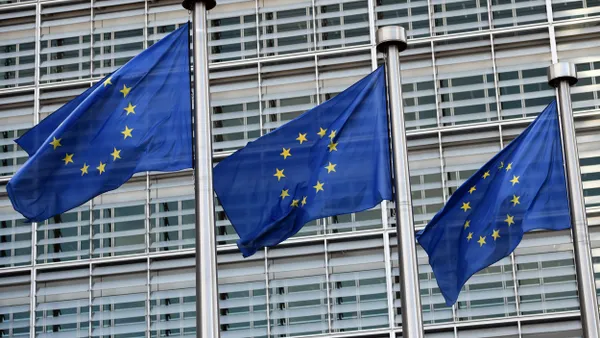Dive Brief:
- Intuitive’s top 2020 goals include increasing U.S. use of its da Vinci robot in hernia repairs, colorectal procedures and bariatrics, and expanding beyond urology in Asia and Europe, according to comments from CEO Gary Guthart on an call with investors Thursday.
- Another key initiative is expanding clearances for its single port system, da Vinci SP, Guthart said on the call following the company's Jan. 9 release of fourth-quarter and full-year earnings. But the top exec tempered expectations for U.S. authorization of a colorectal indication for that system, saying the company doesn't expect the indication to come in 2020 after discussions with FDA suggested it will require an IDE trial with follow-up analysis.
- Given intended market entrants Johnson & Johnson, Medtronic and CMR Surgical, CFO Marshall Mohr told investors “it’s likely [Intuitive] will see elongated negotiation timelines and possibly price pressures as competition gets closer to launching their products.”
Dive Insight:
The company expects 13% to 16% procedure growth in 2020, which analysts at Stifel said "could ultimately prove conservative." Intuitive execs cautioned investors that they expect the first quarter to as usual be "the seasonally weakest quarter as patient deductibles are reset."
Intuitive said its pro forma operating expenses were at the upper end of its 2019 guidance, rising 27%, and it expects them to grow an additional 15% to 20% in 2020.
"We believe we are still in the early days of computer-aided surgery and acute interventions. As a result, we’re investing in building our capability in several important ways, including deepening internationally, launching our new platforms, strengthening our computational capabilities and executing projects that support future scale," Guthart told investors.
The Stifel analysts backed the strategy. "Although some might be disappointed in 2020’s higher operating spend, we believe these technology-expanding/enhancing investments, and the continued business model evolution toward increased leasing arrangements support Intuitive’s long-term growth trajectory in a still largely untapped market," the team wrote in a note to investors following the call.
Intuitive said it expects its percentage of leasing and "alternative financing arrangements" will continue to grow, while system trade-ins will "level off in the short-term and then decline over time."
Instruments and accessories revenue per procedure grew 5% year over year to $1,980. Intuitive said its average selling price (ASP) was up to roughly $1.61 million, versus $1.46 million. That increase was fueled in part by more system placements in China and Japan, where ASPs are higher, the company said, adding that it benefited from an expedited purchase cycle in China as customers sought to preempt tariffs slated to take effect Dec. 15, which have since been suspended.
But pricing pressures could heighten as Intuitive faces meaningful competition. Guthart said he expects “the noise level will increase" from forthcoming market entrants, which could slow dealmaking.
"I think that customers are interested in listening to other pitches. I think we’re pretty well-positioned to have a conversation about that. But I do see delay from time-to-time," he said.












